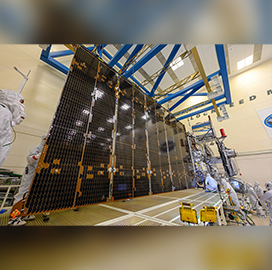The Department of Defense is soliciting public comments on a proposed rule aimed to revise the eligibility criteria for the Defense Industrial Base Cybersecurity Program as part of efforts to encourage more defense contractors to participate in the program and improve the benefits of bilateral information sharing.
DOD is amending the voluntary DIB CS program to align the program description with the updated eligibility requirements, according to a Federal Register notice published Wednesday.
“As a result, references to cleared defense contractors have been replaced with contractors that own or operate a covered contractor information system,” the document reads.
The proposed rule will eliminate the requirement that a company should have an existing facility clearance to at least the Secret level in order for it to be eligible to take part in the program.
According to DOD, the move seeks to help safeguard the department’s controlled unclassified information from cyberattacks and better align the program with DOD’s mandatory cyber incident reporting requirements.
The department has also proposed changes to some definitions, including DIB CS program participant and government furnished information.
Public comments are due June 20.












